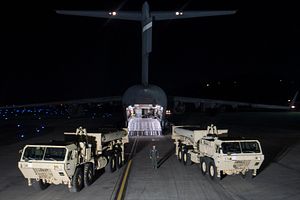On Wednesday, South Korea’s presidential office said that the ongoing deployment of the U.S. Terminal High Altitude Area Defense (THAAD) system should be suspended pending a complete environmental impact assessment of the system.
According to South Korea’s Yonhap News Agency, citing officials with the presidential office, the decision would not affect the two THAAD launchers and the radar that has already been deployed on a golf course in Seongju county, 300 kilometers south of Seoul, the South Korean capital.
“We are not saying the two launchers and other equipment that have already been deployed should be withdrawn. But those that have yet to be deployed will have to wait,” an official with the presidential office told Yonhap.
The THAAD system is designed to protect U.S. forces in South Korea from North Korean ballistic missile strikes and was deployed in Seongju shortly before South Korea’s presidential elections in early May.
Moon Jae-in, who won that election and is the current South Korean president, had strongly opposed the deployment of the THAAD system prior to declaring his candidacy for the presidency. Moon was elected after a corruption scandal engulfed conservative former President Park Geun-hye, whose government had approved the decision.
Moon ultimately moderated his position on the system, but in the past week, another controversy seized his administration when it emerged that the South Korean Ministry of Defense had deliberately withheld information from the presidential office about the delivery of four additional launchers for the THAAD system.
Earlier this week, Moon suspended South Korea’s Deputy Minister for Defense Policy Wee Seung-ho over the issue.
For now, it appears that the remaining four THAAD launchers will be frozen in place until the South Korean government conducts its environmental assessment.
“We will collect the opinions of the defense, foreign affairs, and environment ministries, and brainstorm on ways to resolve the issues related to THAAD, including the environmental impact assessment,” an unnamed South Korean official with the Office for Government Policy and Coordination told Yonhap.
The deployment of THAAD has notably faced strong opposition from China, which says that the X-band AN/TPY-2 radar that accompanies the battery is excessively capable and could harm China’s national security.
In April, the South Korean military and other governmental authorities concluded an environmental inspection in Seongju, at the site of the eventual THAAD deployment.

































